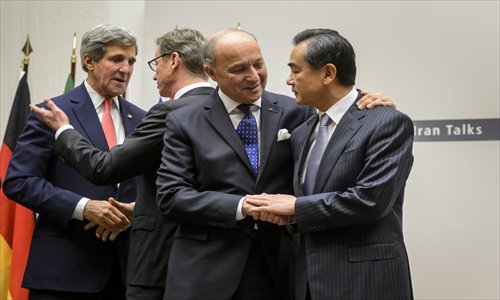Breakthrough Iran nuke deal

US Secretary of State John Kerry, German Foreign Minister Guido Westerwelle, French Foreign Minister Laurent Fabius and Chinese Foreign Minister Wang Yi talk after a statement on Sunday in Geneva. World powers on Sunday agreed a landmark deal with Iran halting parts of its nuclear program. Photo: AFP
Iran agreed to curb its nuclear program in a breakthrough deal Sunday that world powers claimed was the biggest step in decade-long efforts to deny Tehran an atomic bomb, with analysts saying that the move marks a major shift of US strategy in the Middle East.
Tehran boasted that the agreement, which offers Iran limited sanctions relief, recognized its right to enrich uranium, but Washington denied it made any such reference as differences remained after the arduous Geneva talks.
Israel however slammed the deal as an "historic mistake" for failing to ensure the Islamic republic will not seek to acquire nuclear weapons.
Sunni-ruled Gulf monarchies feel let down by their US ally and want good relations with their Shiite neighbor Iran but also fear the Geneva nuclear deal will boost its regional ambitions, analysts say.
The six world powers involved in the marathon talks hailed the preliminary agreement, which seemed unthinkable only a few months ago and at least temporarily warded off the prospect of military escalation.
"A breakthrough step has been made, but only the first on a long and difficult path," said Russian President Vladimir Putin.
China on Sunday hailed the agreement as first-step success with foreign minister Wang Yi saying that "China welcomes the agreement and appreciates the flexible and pragmatic attitudes of all parties during the negotiations."
The deal will neutralize Iran's stockpile of uranium enriched to medium 20-percent purities - close to weapons-grade - within six months, US Secretary of State John Kerry said in Geneva.
In exchange the deal will afford the Islamic republic some $7 billion in sanctions relief and the powers promised to impose no new embargo measures for six months if Tehran sticks by the accord.
This represents "limited, temporary, targeted, and reversible relief while maintaining the vast bulk of our sanctions, including the oil, finance, and banking sanctions architecture," the White House said.
Hailing the deal as "historic," Li Weijian, director of the Institute for Foreign Policy Studies of the Shanghai Institutes for International Studies, told the Global Times that the deal made it clear that the US is shifting its strategic focus away from the Middle East.
Disappointed with the US, its allies in the region, such as Israel and Saudi Arabia, are likely to seek new allies, and as a result, Russia and China are likely to play more important roles in the region, Li noted.
"Compared with a nuclear-armed Iran, Israel is more concerned of the US shifting its strategic focus away from the region, which will leave Israel more isolated," he said.
Agencies contributed to this story